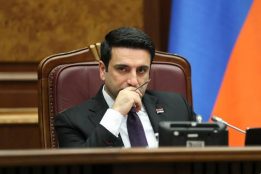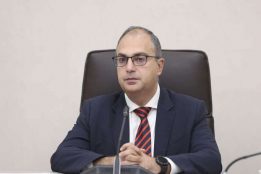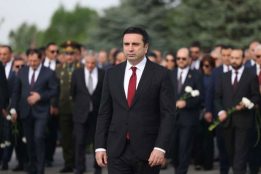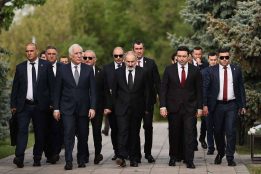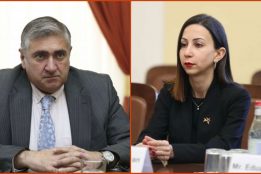The new Prime Minister of Georgia Bidzina Ivanishvili appeared quite surprised when he heard criticism from the Secretary General of the North Atlantic Treaty Organization (NATO), Anders Fogh Rasmussen. Speaking at a press conference in Prague, on November 12, where the Parliamentary Assembly of NATO countries took place, Rasmussen practically accused Ivanishvili’s government of politically motivated arrests.
Rasmussen stated: “We welcome democratic elections in Georgia and the democratic transition of power. Georgia successfully passed the test; however, we are very concerned about recent arrests of political opponents by the new government of the country. I do not hide my concern about what is going on in Georgia, especially, the arrests of the political opponents” (Civil Georgia, November 12)
This statement was made immediately after the NATO secretary general’s meeting with President Saakashvili, which took place two days prior to Rasmussen’s scheduled talk with Ivanishvili in Brussels. Georgian politicians and experts close to the prime minister attributed Rasmussen’s statements to the influence of lobbying firms that Saakashvili had hired to defend his interests in the West. However, NATO is too serious of an organization for its leader to make such tough and unequivocal statements while relying on only one-sided information and without taking into account all available data and possible implications for Georgia.
The detention of the Chief of the Joint Staff of the Georgian armed forces, Georgi Kalandadze is thought to be the immediate cause of Brussels’ irritation. NATO decided to postpone a meeting of the military committee that was scheduled to take place at the end of November in Tbilisi. Ivanishvili’s team explained the postponement as stemming from technical issues. In particular, they said that the Joint Staff was supposed to have provided a venue for the meeting, but holding such a meeting without the Chief of Joint Staff did not make any sense. Perhaps, this played a role. However, the tough statement by NATO’s secretary general finally set the record straight—diplomats in Brussels are not happy with these latest events in Georgia and allude to the Ivanishvili government’s mistakes.
Rasmussen was not the only one to negatively assess the situation in Georgia. On November 13, the head of the European Parliament, Martin Schultz, cautiously but openly noted: “In my country, in Germany, ex-ministers are not put under arrest. For the time being I will refrain from making judgments about arrests in Georgia because I want to examine the situation thoroughly.” “My assistants have received orders to explore this situation and will present a report to me, after that I will make my statement,” Schultz said, referring to the arrest of the former Minister of Defense Bacho Akhalaia for the alleged beating of soldiers .
Meanwhile, President of the European Commission José Manuel Barroso called on the new government of Georgia to avoid incidents of selective justice, because they would “weaken rule of law and damage the country’s image abroad.” Barroso made this statement during a November 12 meeting with the Georgian Prime Minister.
US Ambassador to Georgia Richard Norland also did not shy away from commenting on the situation. “Whenever somebody is arrested we always wish that the due legal process is conducted according to proper procedures and rule of law. We are watching these processes. For NATO it is important who manages the Georgian armed forces,” the Ambassador wrote in a special statement that was disseminated in Tbilisi on the same day Rasmussen’s comments on the arrests became known.
Finally, during his visit to Georgia on November 16, US Assistant Secretary of State for European and Eurasian Affairs Philip Gordon hinted that the West expects from Tbilisi predictability and stability in foreign policy. “I call on both sides to remember: the world, the international community watches you. The US reckons that in order to continue on the continual path of integration with the West, Georgia needs to pass this transitional period in a peaceful and democratic fashion,” Gordon said.
After the Assistant Secretary’s visit, Prime Minister Ivanishvili was forced to admit that the unpleasant remarks by US and European politicians were not the result of “successful lobbying” by Saakashvili, but reflected deep discontent in the West with what is occurring in Georgia. “Democratic countries are not used to such excesses as when new authorities detain the ministers of the previous government,” Ivanishvili noted. “I understand their worries. We try to explain in detail to friendly states, in the first place to the US, that all our actions are democratic and they definitely do not constitute political persecution and selective justice,” he concluded while commenting on the wave of Western criticism; civil.ge/eng/article.php.
“Explain” is the key word in Ivanishvili’s statement. It indicates that Bidzina Ivanishvili still believes that insufficient information is the main source of discontent in the West. It is no wonder, therefore, that with such a misperception of the situation by the Georgian Prime Minister the wave of legal prosecutions did not change and has even widened. Just days later, on November 15, the prosecutor generals arrested the former head of the administration at the interior ministry, Shota Khizanishvili, while rumors about possible arrest of the former Interior Minister Vano Merabishvili began to reverberate in Tbilisi. Merabishvili is known in the West as the author of radical reform of the police and as an uncompromising fighter of corruption.
Ivanishvili, of course, realizes the risks he faces when his government evokes discontent among Georgia’s Western allies. However, in an interview with Die Presse, he still stated that he did not rule out even impeaching President Saakashvili, saying that it was impossible “to stop justice”.
It appears that the prime minister of Georgia reckons that domestic benefits from satisfying the demands of the “protest electorate” are more important than retaining support of the West, which would like to see a stable and predictable partner in Georgia.
Many in Western capitals were happy to see an election-driven change of government in Georgia, and they will plausibly want to build close relations with Bidzina Ivanishvili just as they did with Mikheil Saakashvili. However, the arrests of political rivals, a financial audit of the public broadcaster of Georgia as well as xenophobic statements of some people that are close to the prime minister feed doubts that the new authorities are able to adhere to a pro-Western political course. These mistakes may have high costs not only personally for Ivanishvili, but also for all of Georgia—a country that continues to strive for integration with the West, while still combatting pressure from neighboring Russia.

















